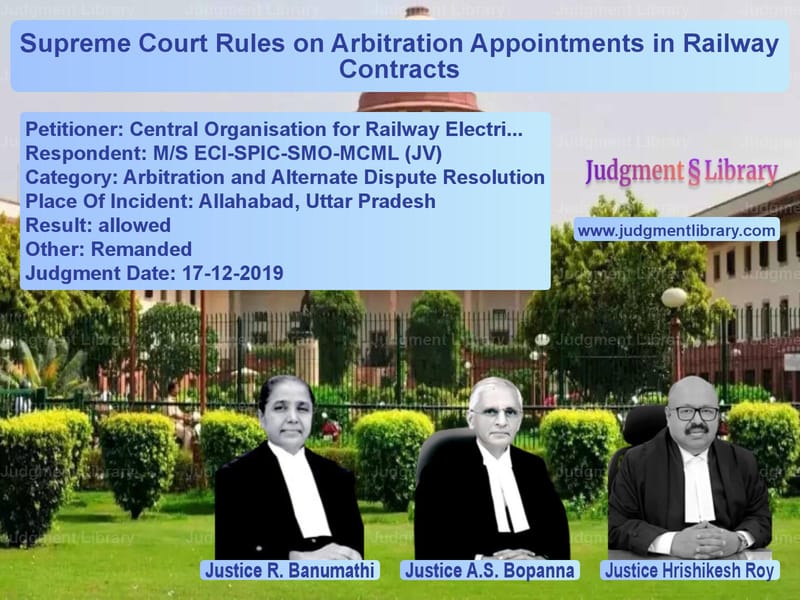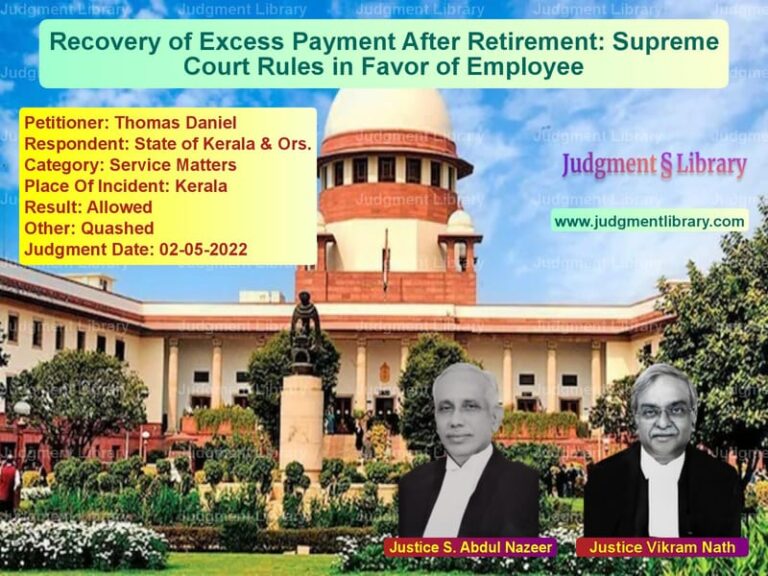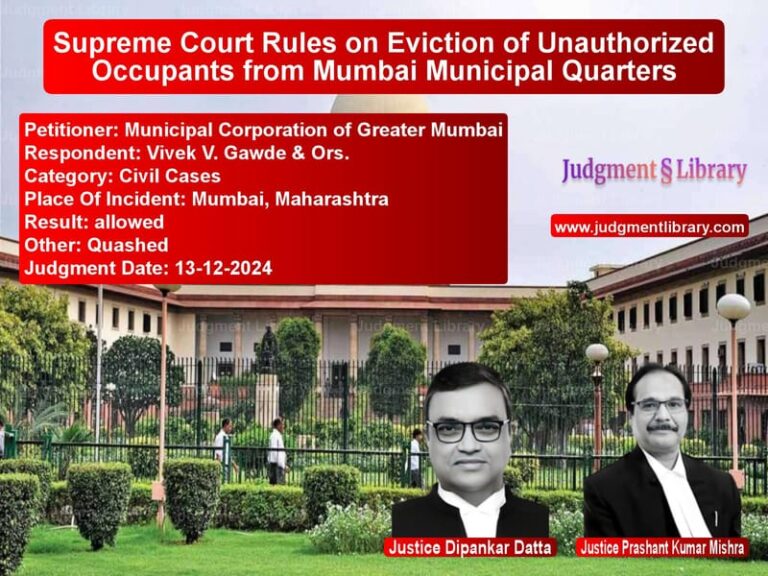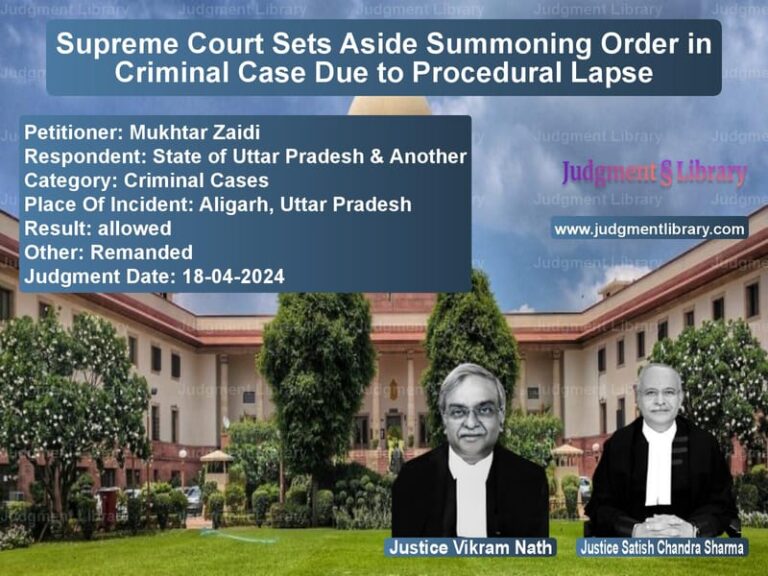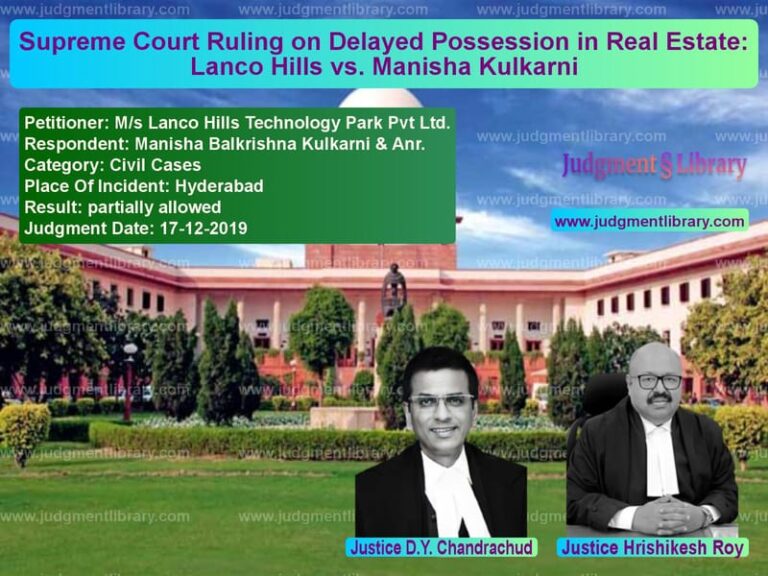Supreme Court Rules on Arbitration Appointments in Railway Contracts
The case of Central Organisation for Railway Electrification v. M/S ECI-SPIC-SMO-MCML (JV) is a crucial ruling on arbitration procedures in government contracts. The Supreme Court, in its judgment dated December 17, 2019, addressed whether an independent arbitrator could be appointed outside the terms of an agreement, particularly when the contract specified a panel of arbitrators. The ruling emphasized that when an agreement provides a specific mechanism for appointing arbitrators, courts should not intervene to appoint an independent arbitrator unless there is a statutory prohibition.
Background of the Case
The appellant, the Central Organisation for Railway Electrification (CORE), awarded a work contract worth Rs. 165.67 crores to the respondent, M/S ECI-SPIC-SMO-MCML (JV), through an agreement dated September 20, 2010. The contract included an arbitration clause, governed by Clause 64 of the General Conditions of Contract (GCC). After amendments to the Arbitration and Conciliation Act, 1996 in 2015, the Ministry of Railways issued a notification modifying Clause 64 of the GCC.
The contract was terminated by CORE on November 1, 2017, due to non-completion of work, leading to a dispute where the respondent claimed Rs. 73.35 crores. When the appellant proposed a panel of arbitrators per Clause 64, the respondent approached the Allahabad High Court under Section 11(6) of the Arbitration Act, seeking an independent arbitrator. The High Court appointed Justice Rajesh Dayal Khare, a retired judge of the Allahabad High Court, as the sole arbitrator.
Petitioner’s Arguments
The appellant, CORE, contended that:
- The contract explicitly provided for arbitration under a panel of three arbitrators, as per Clause 64(3)(a)(ii) and Clause 64(3)(b) of the GCC.
- Since the contract’s value exceeded Rs. 1 crore, the arbitral tribunal should consist of three members, including railway officers.
- The High Court erred in appointing an independent arbitrator outside the agreed process.
- The Railway Board’s amendments to Clause 64 ensured compliance with the Arbitration and Conciliation Act and allowed fair selection of arbitrators.
Respondent’s Arguments
The respondent, M/S ECI-SPIC-SMO-MCML (JV), argued that:
- The list of arbitrators provided by the appellant consisted of serving or retired railway officers, making them biased.
- The High Court had the authority under Section 11(6) of the Arbitration Act to appoint a neutral arbitrator.
- Since the respondent did not waive the applicability of Section 12(5) of the Arbitration Act, the appointment of railway officers was legally invalid.
Supreme Court’s Analysis
The Supreme Court examined the contractual terms and legal provisions, holding that:
- Arbitration agreements must be honored unless they are legally void or unenforceable.
- Clause 64(3)(a)(ii) and 64(3)(b) of the GCC explicitly provided for a three-member tribunal.
- The respondent was given an opportunity to select arbitrators from a panel but failed to respond.
- The High Court erred in appointing an independent arbitrator without following the contractually agreed process.
The Court emphasized:
“When the agreement specifically provides for the appointment of an arbitral tribunal consisting of three arbitrators, the appointment of an independent sole arbitrator by the High Court is not sustainable.”
Key Legal Precedents Cited
The Supreme Court relied on the following judgments:
- Union of India v. Parmar Construction Company – Holding that contractual arbitration clauses must be adhered to unless legally void.
- TRF Limited v. Energo Engineering Projects Ltd. – Discussing ineligibility of interested parties in arbitration.
- Voestalpine Schienen GmbH v. Delhi Metro Rail Corporation – Clarifying that selection of arbitrators from a government panel does not necessarily imply bias.
Final Judgment
The Supreme Court set aside the High Court’s decision and ruled:
“The appellant is directed to send a fresh panel of four retired officers to the respondent within thirty days. The respondent shall select two names, and the appellant shall form the Arbitral Tribunal in terms of Clause 64 of the GCC.”
Impact of the Judgment
This ruling has significant implications:
- It reinforces that arbitration agreements must be followed strictly.
- It limits judicial intervention in arbitration appointments unless there is a clear violation of the Arbitration Act.
- It clarifies that retired government officers can serve as arbitrators unless explicitly disqualified.
- It strengthens the Railway Board’s arbitration procedures and prevents unnecessary litigation.
Conclusion
The Supreme Court’s decision in Central Organisation for Railway Electrification v. M/S ECI-SPIC-SMO-MCML (JV) ensures that contractual arbitration mechanisms are upheld. By rejecting the High Court’s appointment of an independent arbitrator, the judgment reinforces the principle that parties must adhere to their agreed dispute resolution mechanisms unless a statutory prohibition applies.
Petitioner Name: Central Organisation for Railway Electrification.Respondent Name: M/S ECI-SPIC-SMO-MCML (JV).Judgment By: Justice R. Banumathi, Justice A.S. Bopanna, Justice Hrishikesh Roy.Place Of Incident: Allahabad, Uttar Pradesh.Judgment Date: 17-12-2019.
Don’t miss out on the full details! Download the complete judgment in PDF format below and gain valuable insights instantly!
Download Judgment: Central Organisation vs MS ECI-SPIC-SMO-MCM Supreme Court of India Judgment Dated 17-12-2019.pdf
Direct Downlaod Judgment: Direct downlaod this Judgment
See all petitions in Arbitration Awards
See all petitions in Dispute Resolution Mechanisms
See all petitions in Institutional Arbitration
See all petitions in Judgment by R. Banumathi
See all petitions in Judgment by A. S. Bopanna
See all petitions in Judgment by Hrishikesh Roy
See all petitions in allowed
See all petitions in Remanded
See all petitions in supreme court of India judgments December 2019
See all petitions in 2019 judgments
See all posts in Arbitration and Alternate Dispute Resolution Category
See all allowed petitions in Arbitration and Alternate Dispute Resolution Category
See all Dismissed petitions in Arbitration and Alternate Dispute Resolution Category
See all partially allowed petitions in Arbitration and Alternate Dispute Resolution Category

